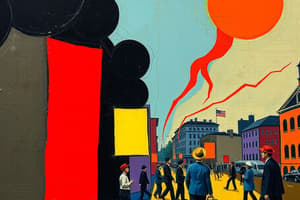Podcast
Questions and Answers
How did the Treaty of Versailles contribute to the rise of Nazi Germany and ultimately World War II?
How did the Treaty of Versailles contribute to the rise of Nazi Germany and ultimately World War II?
- The treaty imposed harsh economic reparations on Germany, leading to economic instability and resentment.
- It forced Germany to disarm, creating a power vacuum that allowed extremist ideologies to flourish.
- It stripped Germany of territory, creating a sense of national humiliation and fueling territorial ambitions.
- All of the above. (correct)
What was the primary reason for Japan's invasion of Manchuria in 1931?
What was the primary reason for Japan's invasion of Manchuria in 1931?
- To create a buffer zone against potential threats from the Soviet Union.
- To secure vital resources, such as coal and iron, needed for its industrial growth. (correct)
- To expand its empire and establish dominance in East Asia.
- To gain access to new markets for its manufactured goods.
How did the appeasement policy of Britain and France toward Nazi Germany ultimately contribute to the outbreak of World War II?
How did the appeasement policy of Britain and France toward Nazi Germany ultimately contribute to the outbreak of World War II?
- It emboldened Hitler and convinced him that he could achieve his territorial goals without facing any significant opposition.
- It weakened the League of Nations and demonstrated the unwillingness of Western powers to enforce international law.
- It created a climate of fear and uncertainty, leading to a breakdown in diplomatic relations and fueling tensions.
- All of the above. (correct)
Which of the following events best exemplifies the concept of appeasement in the lead-up to World War II?
Which of the following events best exemplifies the concept of appeasement in the lead-up to World War II?
What was one of the primary reasons why Britain and France adopted the policy of appeasement in the 1930s?
What was one of the primary reasons why Britain and France adopted the policy of appeasement in the 1930s?
What was the main reason for the signing of the Nazi-Soviet Pact between Germany and the Soviet Union in 1939?
What was the main reason for the signing of the Nazi-Soviet Pact between Germany and the Soviet Union in 1939?
Which of the following statements accurately reflects how the Great Depression affected Japan's economy?
Which of the following statements accurately reflects how the Great Depression affected Japan's economy?
In what way did the Great Depression contribute to the rise of radical political movements around the world?
In what way did the Great Depression contribute to the rise of radical political movements around the world?
Which of these events best marked the turning point in World War II when the United States became fully involved in the conflict?
Which of these events best marked the turning point in World War II when the United States became fully involved in the conflict?
How did Hitler use propaganda effectively to gain support for his policies and rise to power in Germany?
How did Hitler use propaganda effectively to gain support for his policies and rise to power in Germany?
How did Germany's economy specifically suffer during the Great Depression?
How did Germany's economy specifically suffer during the Great Depression?
What was Stalin's primary motivation for signing the Nazi-Soviet Pact?
What was Stalin's primary motivation for signing the Nazi-Soviet Pact?
What was the primary motivation behind Japan's military expansion in the 1930s?
What was the primary motivation behind Japan's military expansion in the 1930s?
What was a key consequence of appeasement on Hitler's actions?
What was a key consequence of appeasement on Hitler's actions?
How did Japan’s invasion of Manchuria in 1931 further contribute to the growing tensions and instability that ultimately led to World War II?
How did Japan’s invasion of Manchuria in 1931 further contribute to the growing tensions and instability that ultimately led to World War II?
What was the impact of the Treaty of Versailles on Germany's economic recovery and political stability in the years after World War I?
What was the impact of the Treaty of Versailles on Germany's economic recovery and political stability in the years after World War I?
Which of the following options best describes the policy of protectionism?
Which of the following options best describes the policy of protectionism?
How did the Great Depression impact the League of Nations' effectiveness?
How did the Great Depression impact the League of Nations' effectiveness?
How did Britain and France attempt to mitigate the effects of the Great Depression?
How did Britain and France attempt to mitigate the effects of the Great Depression?
How did the Treaty of Versailles contribute to the rise of appeasement?
How did the Treaty of Versailles contribute to the rise of appeasement?
Flashcards
Munich Agreement
Munich Agreement
A 1938 agreement allowing Hitler to annex the Sudetenland.
Significance of Munich Agreement
Significance of Munich Agreement
Showed Hitler that Britain and France would avoid conflict.
Nazi-Soviet Pact
Nazi-Soviet Pact
A non-aggression agreement between Germany and the USSR, signed in August 1939.
Operation Barbarossa
Operation Barbarossa
Signup and view all the flashcards
Japan's invasion of Manchuria
Japan's invasion of Manchuria
Signup and view all the flashcards
League of Nations response
League of Nations response
Signup and view all the flashcards
Causes of WWII
Causes of WWII
Signup and view all the flashcards
Blitzkrieg
Blitzkrieg
Signup and view all the flashcards
Anschluss
Anschluss
Signup and view all the flashcards
Germany's invasion of Poland
Germany's invasion of Poland
Signup and view all the flashcards
Great Depression Trigger
Great Depression Trigger
Signup and view all the flashcards
Economic Collapse from Crash
Economic Collapse from Crash
Signup and view all the flashcards
International Trade Decline
International Trade Decline
Signup and view all the flashcards
Unemployment in Germany
Unemployment in Germany
Signup and view all the flashcards
Japan’s Economic Troubles
Japan’s Economic Troubles
Signup and view all the flashcards
Weakening of the League of Nations
Weakening of the League of Nations
Signup and view all the flashcards
Protectionism
Protectionism
Signup and view all the flashcards
Japan’s Military Expansion
Japan’s Military Expansion
Signup and view all the flashcards
Appeasement Policy
Appeasement Policy
Signup and view all the flashcards
Reasons for Appeasement
Reasons for Appeasement
Signup and view all the flashcards
Study Notes
The Great Depression and Global Impact
- The Wall Street Crash of 1929 triggered the Great Depression.
- Panic selling of stocks led to bankruptcies and widespread unemployment.
- Protectionist trade policies reduced global trade.
- Germany suffered severely, causing support for radical parties like the Nazis.
- Japan, reliant on exports (especially silk), experienced economic struggles.
- The League of Nations' authority weakened due to economic crises.
- Protectionism involves tariffs to defend domestic industry.
- Japan's economic difficulties led to military expansion, beginning with the 1931 invasion of Manchuria.
- Britain and France mitigated the effects by expanding trade within empires.
- Radical political movements gained popularity due to faith in democracies eroding.
Appeasement Policy
- Appeasement is a policy of conceding to an aggressor's demands.
- Britain and France appeased due to war preparedness and desire to avoid conflict.
- The perceived harshness of the Treaty of Versailles encouraged appeasement.
- Economic struggles during the Depression influenced the policy.
- Appeasement emboldened Hitler toward aggressive actions.
- The Munich Agreement (1938) allowed Hitler to seize the Sudetenland.
- This demonstrated Hitler's belief that Britain and France would not resist.
- Chamberlain claimed "peace for our time" after the Munich Agreement.
- Appeasement prompted Stalin to sign the Nazi-Soviet Pact.
- Germany's invasion of Poland ended appeasement.
Nazi-Soviet Pact and Hitler's Expansion
- The Nazi-Soviet Pact was a non-aggression treaty between Germany and the USSR (1939).
- A secret clause divided Poland between them.
- This surprising pact involved opposing ideologies: fascism and communism.
- The pact allowed Hitler to invade Poland without Soviet intervention.
- Britain and France declared war on Germany after the invasion.
- Hitler claimed Germans in Poland required protection for invasion justification.
- The pact symbolized an unlikely alliance between Hitler and Stalin.
- Stalin sought time to prepare for a possible conflict with Germany.
- Hitler broke the pact by invading the USSR in Operation Barbarossa (June 1941).
- Operation Barbarossa significantly shifted Soviet involvement in the war.
Japan's Expansion and Militarism
- Japan's first significant act was invading Manchuria in 1931.
- Need for resources (coal, iron) fueled the Manchurian invasion.
- The League of Nations condemned Japan but took no action.
- Manchukuo was a puppet state established by Japan.
- The Great Depression drove Japan toward militarism with the rise of expansionist leaders.
- Japan's expansion was justified by claims of needing space for its population.
- Japan aligned itself with the Axis Powers (Germany and Italy) in 1940.
- The US halting oil supplies to Japan prompted the attack on Pearl Harbor.
- The US declared war on Japan after the attack on Pearl Harbor.
- Hitler reacted by declaring war on the US.
Causes of World War II
- Key causes include militarism, alliances, nationalism, imperialism, appeasement, and economic instability.
- The Treaty of Versailles fostered resentment and influenced Hitler's rise.
- Hitler's Lebensraum concept aimed for expanded German territory, especially in Eastern Europe.
- The League of Nations' weakness allowed unchecked aggression.
- Hitler violated the Treaty by rearming Germany and remilitarizing the Rhineland.
- The Anschluss merged Germany with Austria (1938).
- Hitler used propaganda to gain support by promoting nationalism and anti-semitism.
- Germany's invasion of Poland (September 1, 1939) formally started WWII.
- Blitzkrieg was a German military tactic of swift, coordinated attacks.
- WWII became a global conflict due to involvement of major world powers.
Studying That Suits You
Use AI to generate personalized quizzes and flashcards to suit your learning preferences.




